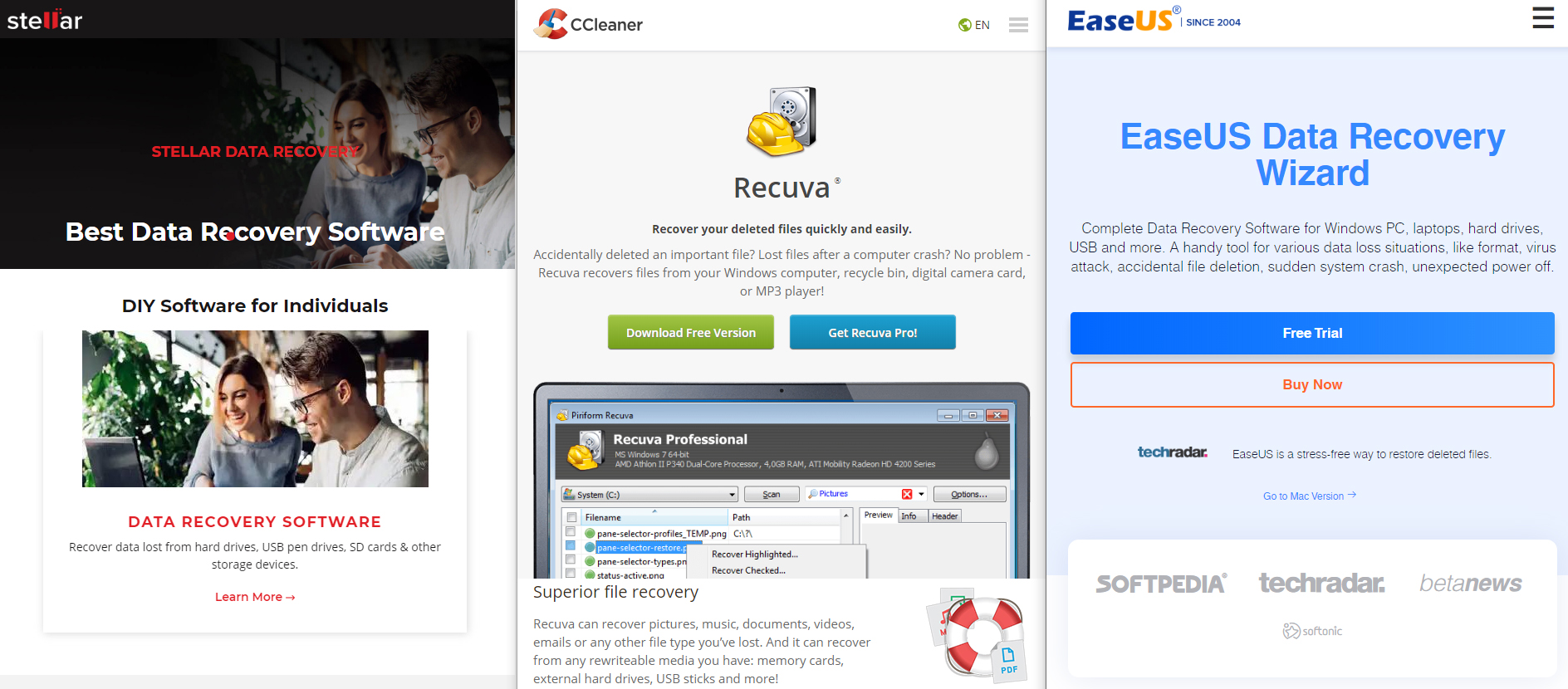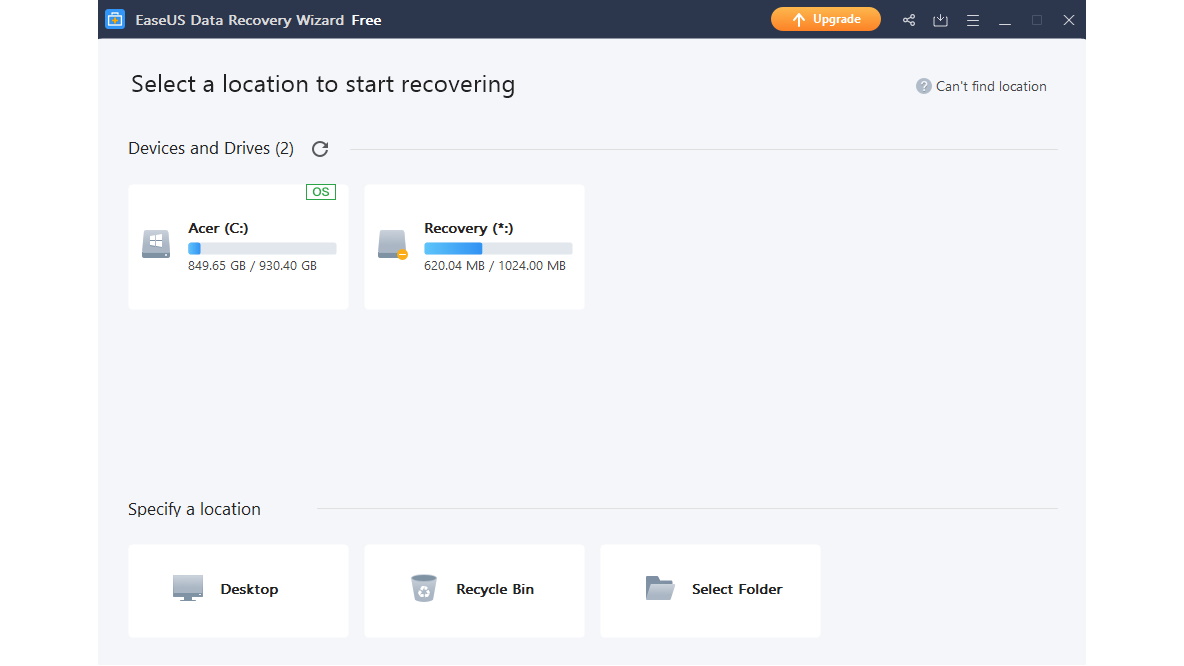Recuva vs EaseUS vs Stellar: what's the best free data recovery software?
Read our detailed comparison of three best free data recovery software

There are numerous free data recovery apps available, but not all of them are powerful enough to deliver the expected results and retrieve deleted or accidentally lost files. On top of this, many of the free programs on the market only work on certain devices or are slow, laggy, and downright unusable.
Because of this, we’ve put together the following comparison between Recuva, Stellar Data Recovery, and EaseUS Data Recovery Wizard Pro, three of the most powerful free data recovery software programs on the market. We’ve completed an in-depth analysis of their main features, performance, and customer support to bring you a clear conclusion.
If you're looking for more options (including paid) then read our guide to the best data recovery software.

Features
Recuva, EaseUS, and Stellar all come with an impressive selection of hard drive recovery features. All three are designed with quick and deep scan capabilities and come with impressive free tools for personal and business users.
For starters, Stellar and EaseUS are compatible with both Windows and Mac operating systems, although Recuva is only available on Windows. In addition, Recuva’s free plan is only available for personal use, and business users will need to pay for a commercial license. Stellar allows up to 1GB of free data retrieval, while EaseUS supports 2GB of file restoration.
If you only need to retrieve personal files, Recuva is a great option. It supports reformatted and damaged drive restoration and comes with rapid scanning tools to reduce downtime and improve efficiency. Recovered files can be restored directly to a virtual hard drive (VHD), and it even supports recovery from damaged VHDs. Confidential or sensitive files can be destroyed with the secure overwrite tools.
EaseUS is arguably even more powerful, with impressive Windows and Mac-specific features. It allows you to retrieve corrupted or otherwise inaccessible data and supports a range of external storage devices. Files can be restored while a scan is in progress, and you can even preview recovered files before saving them.
Are you a pro? Subscribe to our newsletter
Sign up to the TechRadar Pro newsletter to get all the top news, opinion, features and guidance your business needs to succeed!
Finally, Stellar supports all known file formats and allows you to add custom formats if necessary. Optical media recovery is possible, while RAID, non-bootable, encrypted, and virtual drive storage scanning is fast and simple.
Overall, Stellar just comes out ahead here because it supports a comprehensive range of devices and all file types.

Performance
To facilitate an accurate comparison between Stellar, EaseUS, and Recuva, we intentionally deleted a selection of files from the hard drive of our Windows test laptop (which has 8GB of RAM and a 1TB hard drive). We then completed standard and deep scans with all three programs to determine how well they work. They all successfully retrieved the test files, along with thousands of others that had been deleted in the past.
EaseUS was the fastest of the three programs, with a standard scan completed in under one minute. A deep scan took just over two and a half hours, and neither used more than 30% CPU or 250MB of RAM.
Stellar was slightly slower, but it did use significantly more computer resources. A quick scan took just under four minutes, and the deep scan took just over 12 hours. But both used over 75% CPU power and around 200MB of RAM, which means you could have trouble running Stellar alongside other programs.
And finally, Recuva’s rapid scan was also very quick, finishing in just over a minute. However, it took almost 24 hours to complete a deep scan, which is quite slow. In saying that, neither used more than 600MB of RAM or 10% CPU, which means it could be comfortably run in the background.
Overall, EaseUS has the best performance, simply because of its very fast deep scan capability and low CPU usage. However, all three programs performed extremely well during testing and retrieved all test files.

Support
All three programs provide a selection of support services. Recuva has email support, but note that paid subscribers will receive priority over free users. Fortunately, it also comes with great technical documentation, detailed video tutorials, and a friendly community forum.
Meanwhile, EaseUS offers live chat, email, and phone support options. Live chat is available Monday through Friday from 9am to 5:30pm (UTC+8). Offline documentation and an informative knowledge base are also available.
However, Stellar stands out as the clear winner with the best support services. Its live chat agents are friendly and knowledgeable, worldwide English-language phone support is available, and complex issues are dealt with through an online ticket system. The self-help options are equally great, with an in-depth knowledge base containing impressive videos, how-to guides, and a range of other resources.

Verdict
Ultimately, Recuva, EaseUS, and Stellar all stand out as exceptional free data recovery programs. As expected, though, the free versions do have their limitations.
Recuva offers unlimited recovery, but its free plan is only available for personal use, and only Windows devices are supported. EaseUS is a powerful option with Mac and Windows support, a range of powerful features, and fast, efficient performance. And finally, Stellar allows data recovery from almost any device and offers powerful support services.
Overall, we’d recommend Recuva for personal users who need to retrieve large numbers of lost files and Stellar for business users. Commercial users who want to restore more than 2GB of data may need to upgrade to a paid plan.
- Check out our guide to the Best data recovery software
Daniel is a freelance copywriter with over six years experience writing for publications such as TechRadar, Tom’s Guide, and Hosting Review. He specializes in B2B and B2C tech and finance, with a particular focus on VoIP, website building, web hosting, and other related fields.
